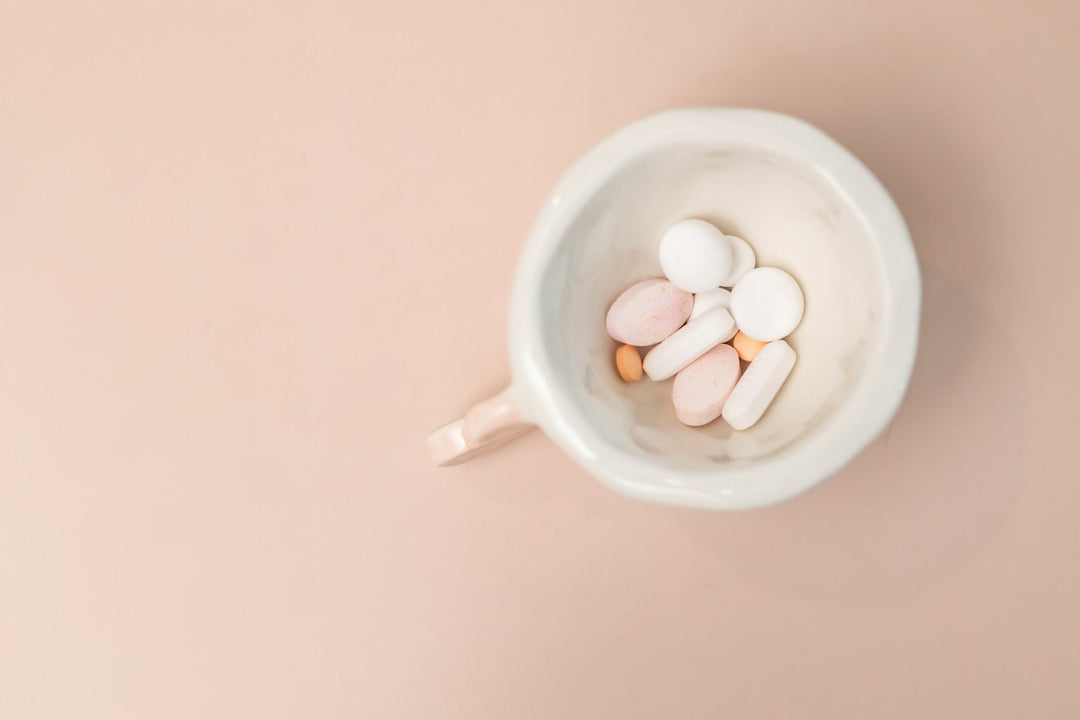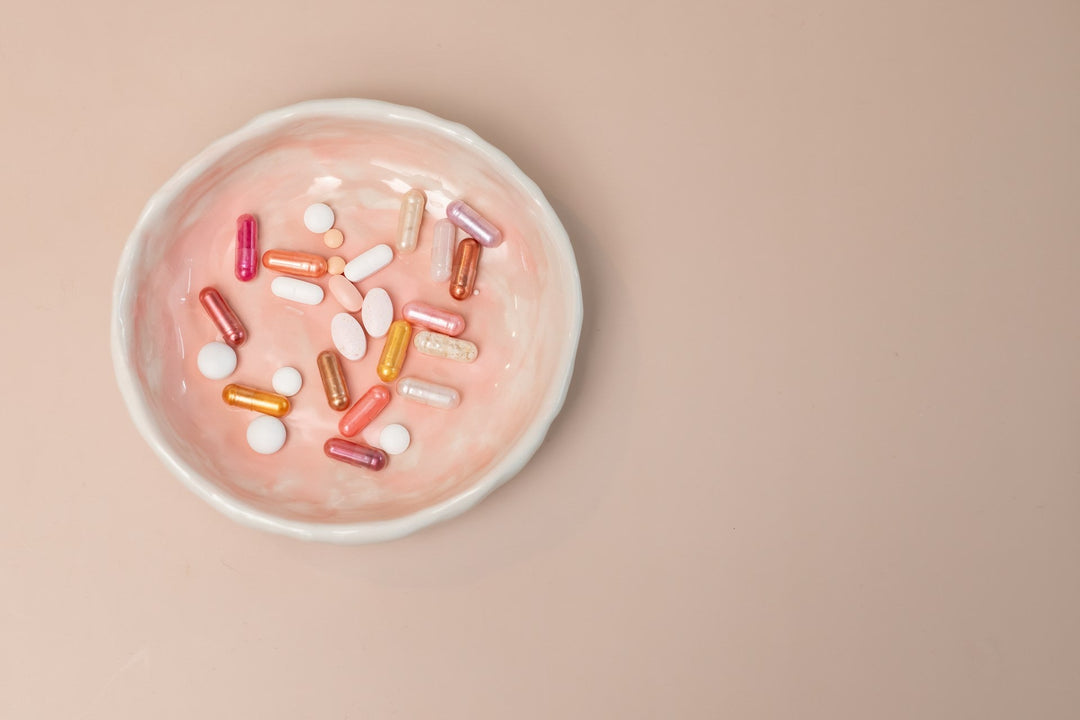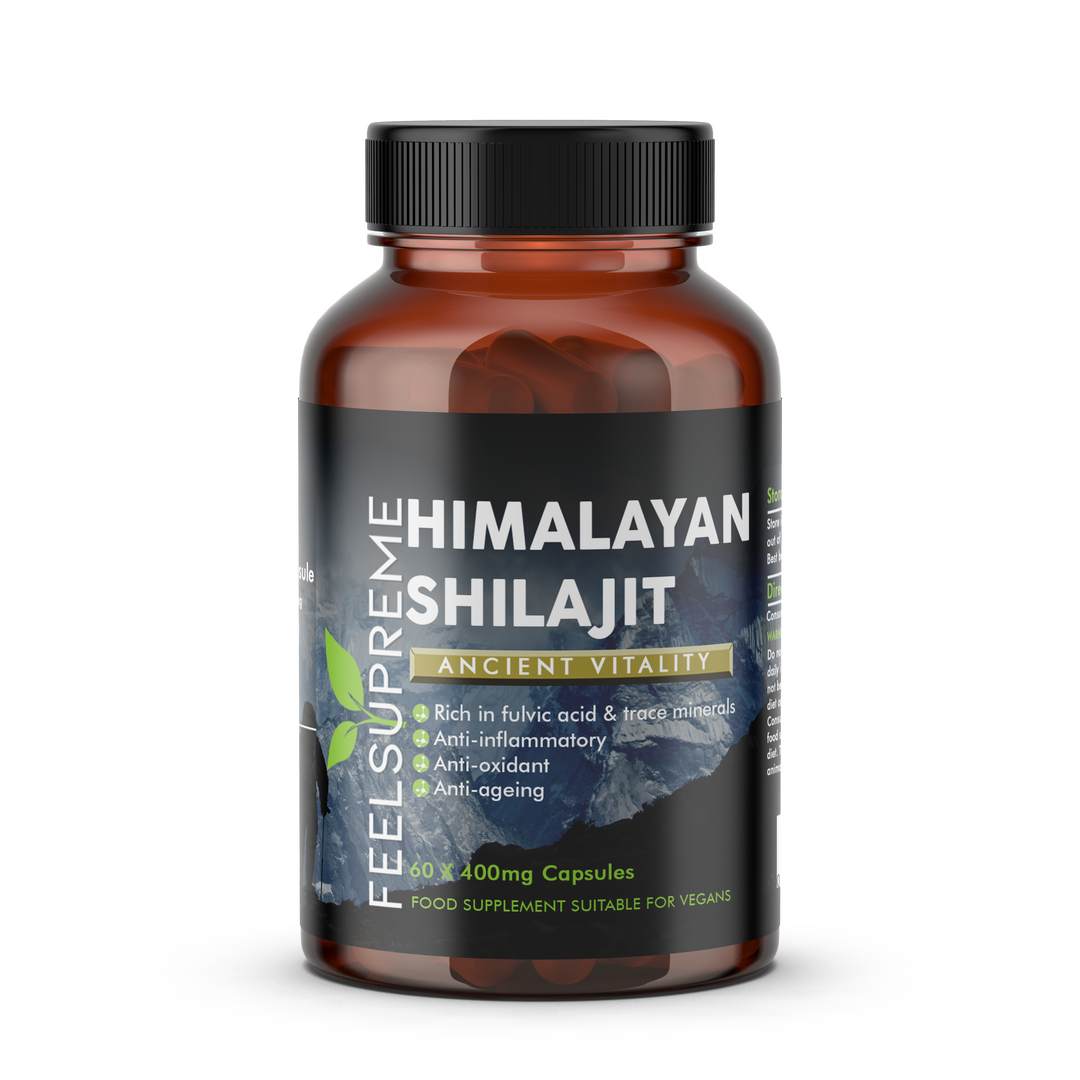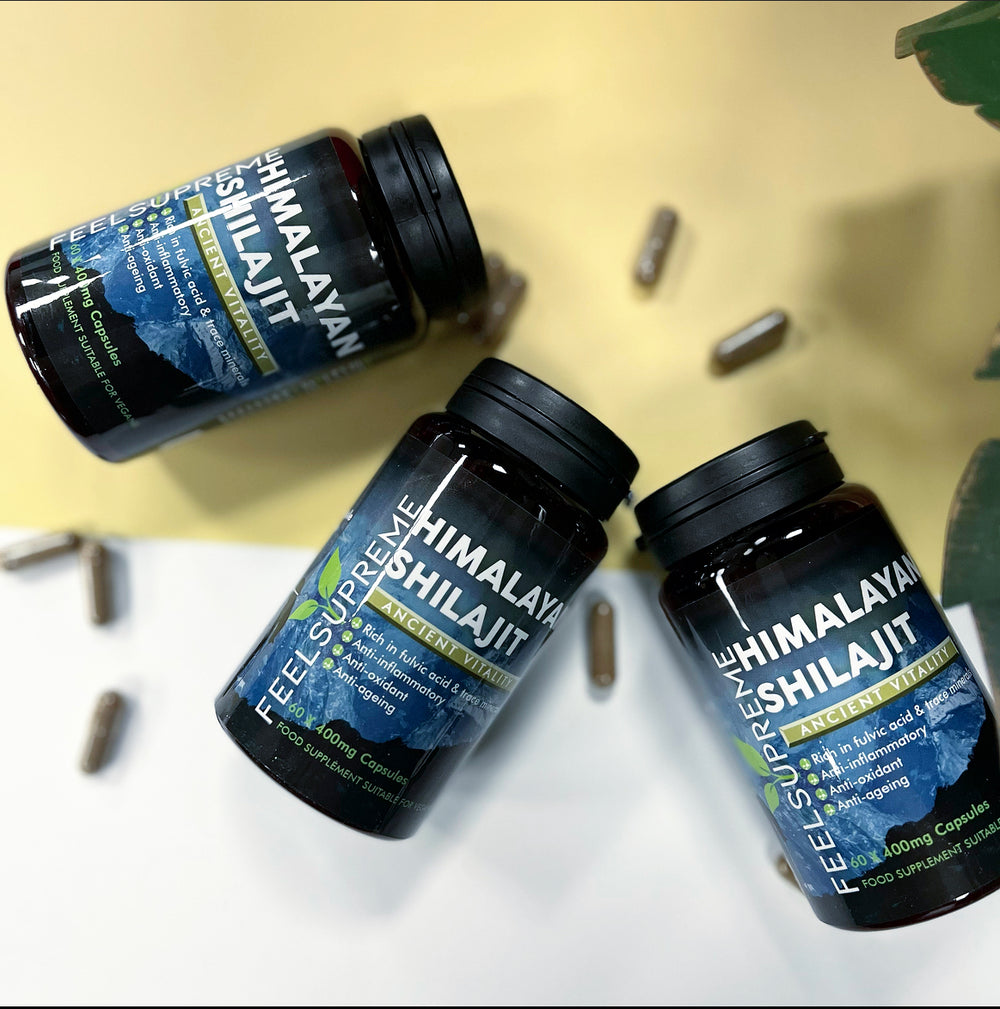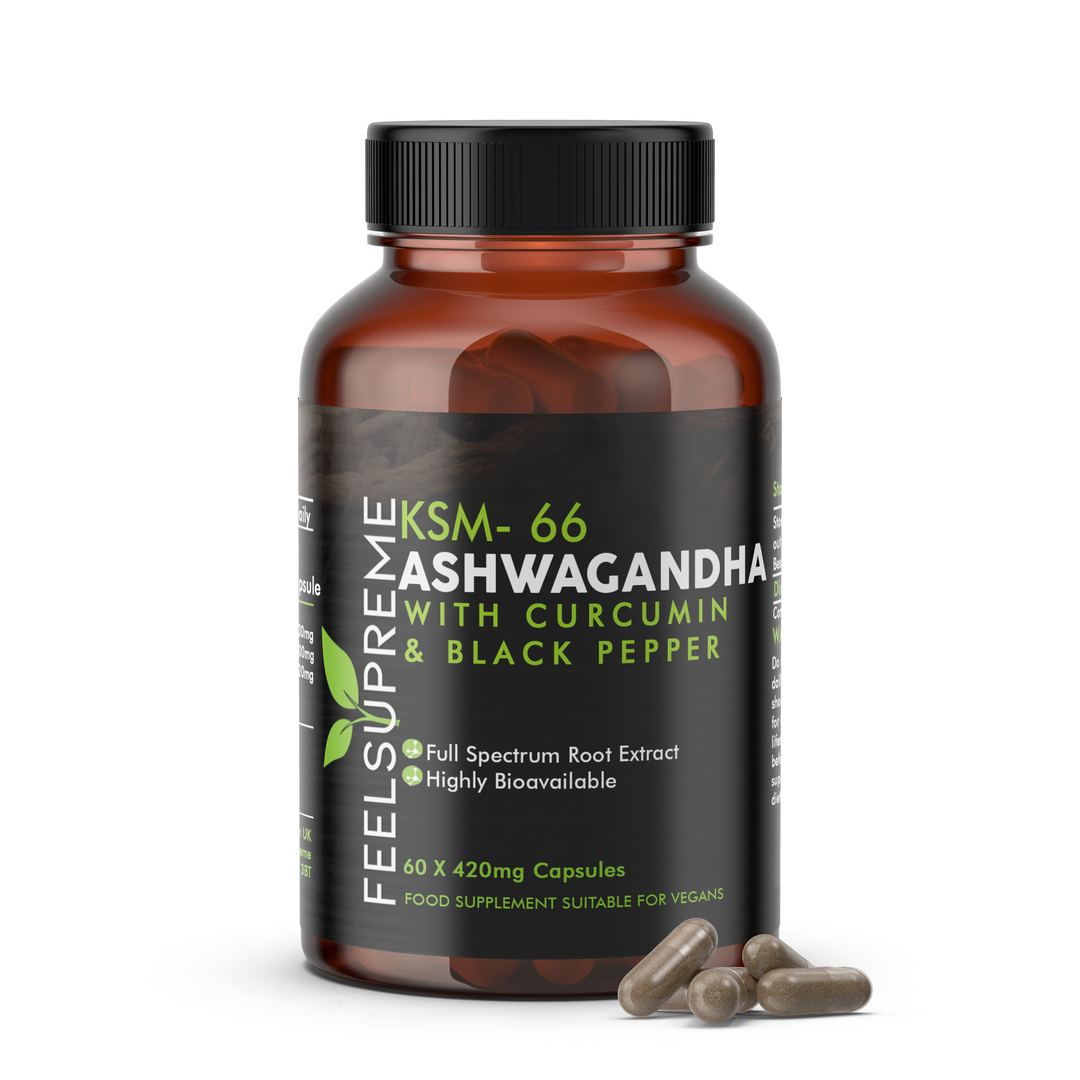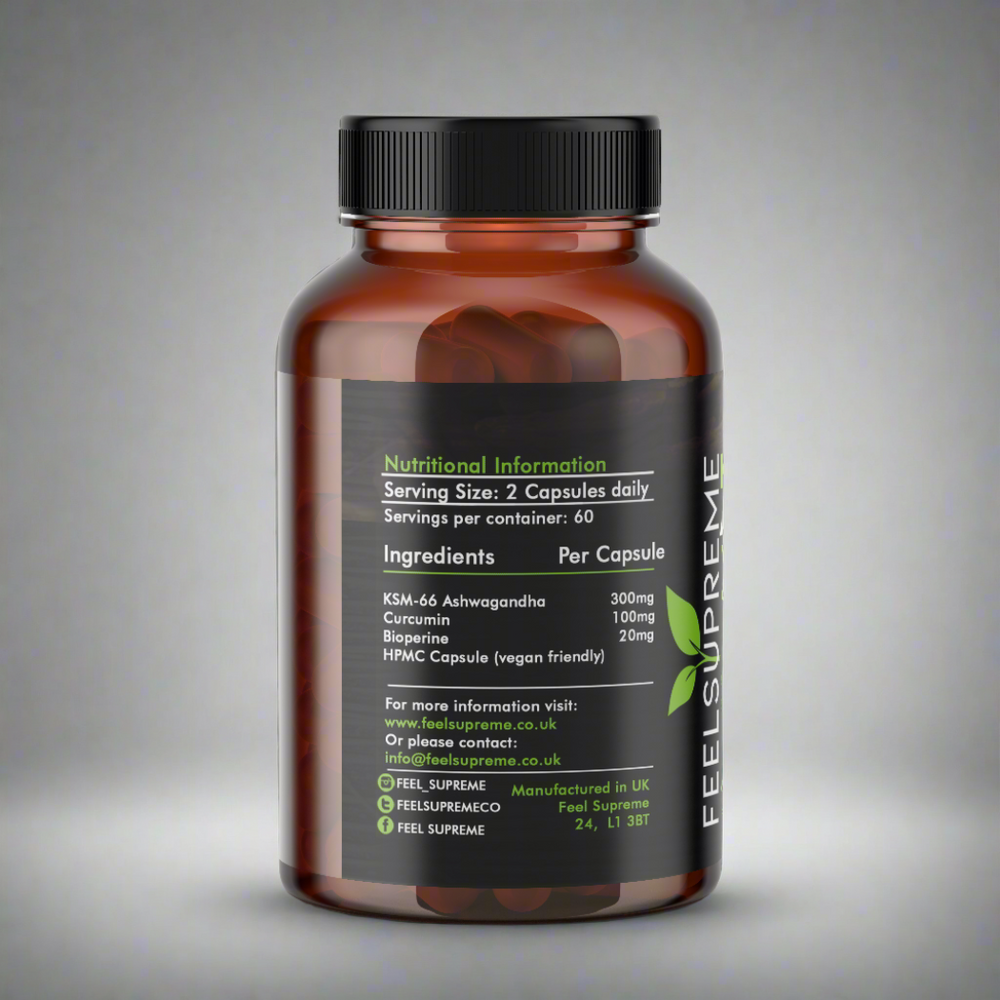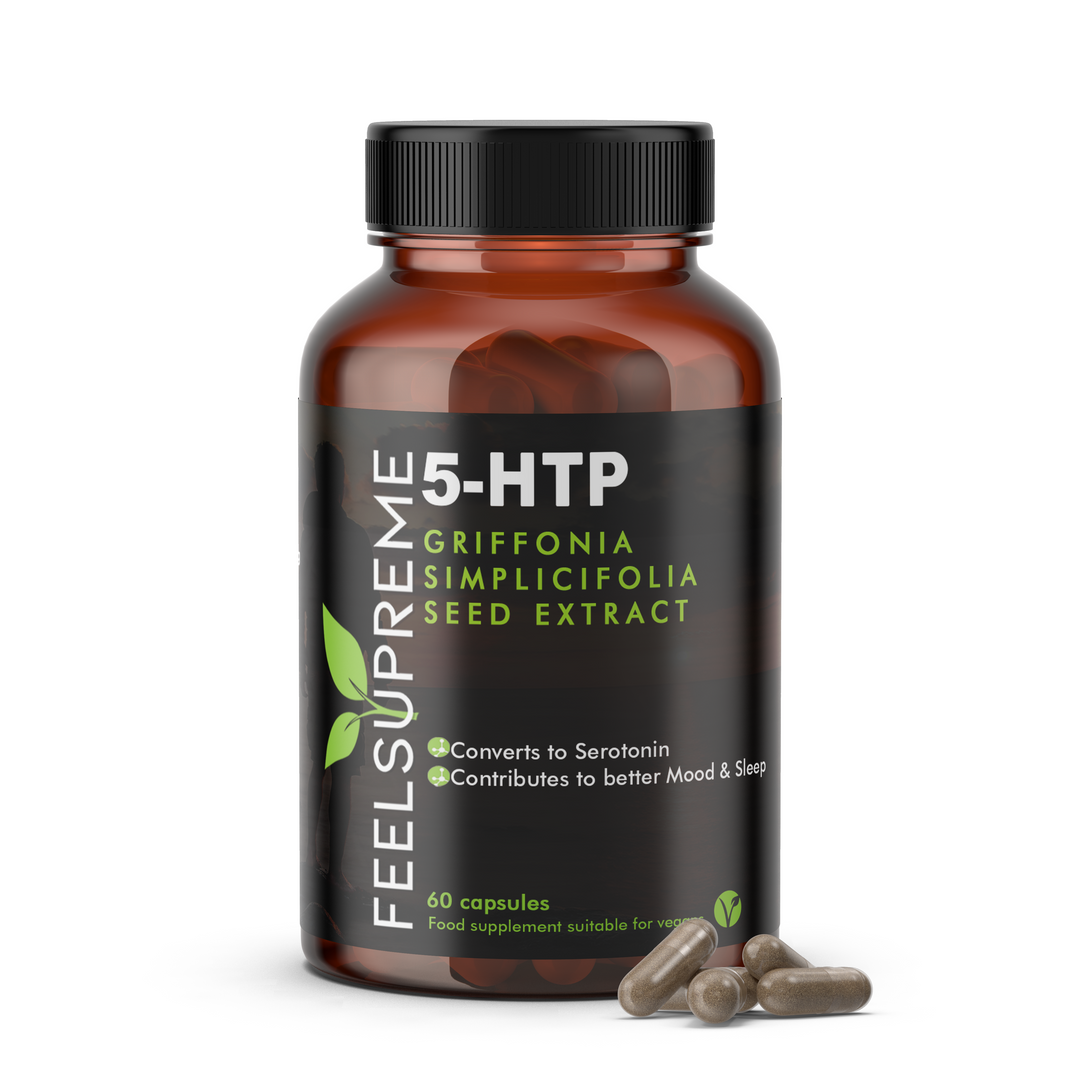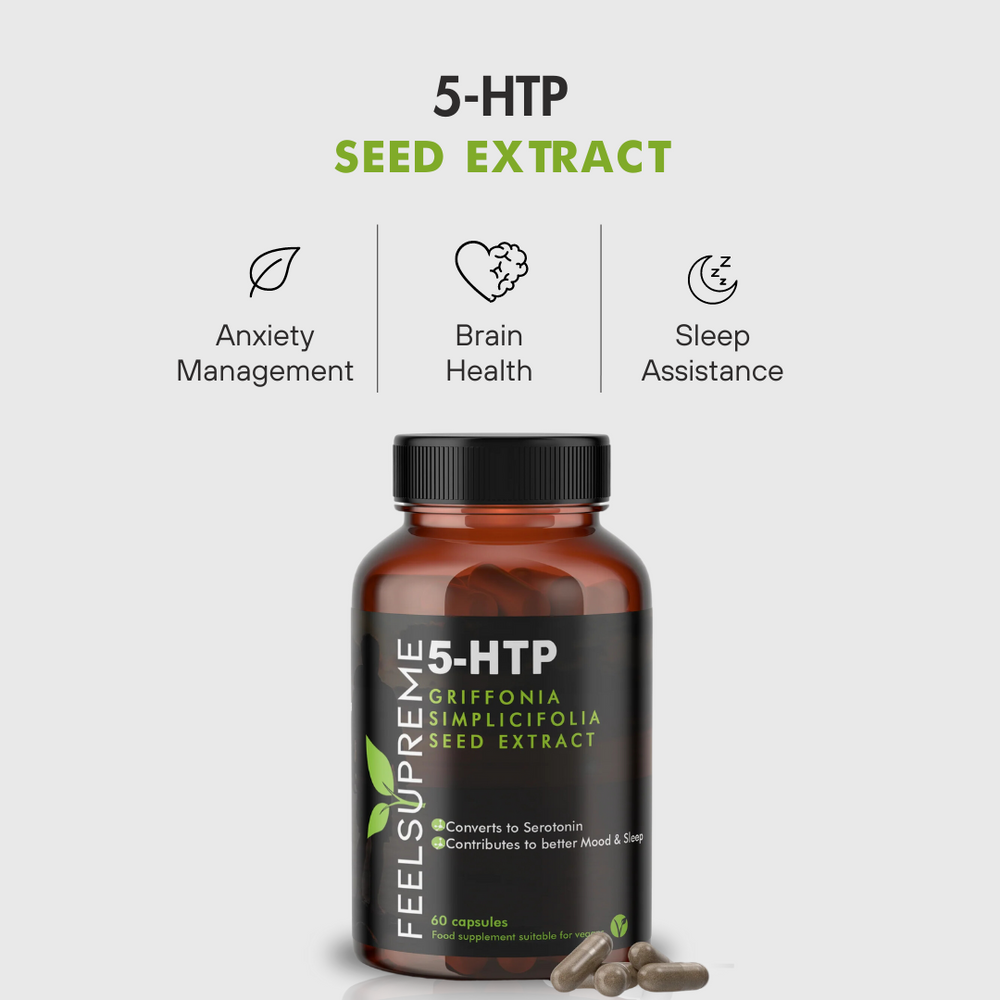Our company ethos at Feel Supreme is all about taking an holistic approach to healthy living. We believe that there are many variables which need to tie together in order to proceed through the various levels on your path to optimal health. Once these variables become part of your life, similar to Trivial Pursuit wedges filling up your playing peice, only then will your health truly start to flourish. Lions mane mushroom, liquid chlorophyll, himalayan shilajit are the most common organic supplements used in the UK. We will outline below, the basics of these variables. But before we do so, it's important to remember that any change in lifestyle you embark on has to be realistic for you, the individual. It's senseless to try to live a lifestyle that your budget or current circumstances do not allow. For example, the purest form of water is glass bottled, spring water, rich in minerals, which has been filtered naturally through the earth. However, like most things in life, the higher quality comes at a higher cost. As long as you are filling all segments of your Trivial Pursuit piece, then I wouldn't get too hung up about consuming distilled and remineralised water, shungite water or even tap water! You just have to decide what level is most realistic for you. Speaking of which...
 But what do we mean by 'hydrating fluids'? The most obvious hydrating fluid is water, with herbal teas and 1 glass of natural fruit juice per day also being classed as hydrating fluids. We would advise to dilute your natural fruit juices at a ratio of 1:1 to limit the impact of the high natural sugar content, and the absence of the fruits natural fibre content . This is particulary important if you have blood sugar issues, which is not neccessarily just diabetes (more on this in a later blog). Tea and coffee are diuretics, meaning they increase your output of urine, which can be argued has the opposite effect of hydrating you. However, some claim that the amount of water added to the coffee beans/ tea leaves counteracts the diurectic effect. But for the purpose of hydration, tea and coffee wouldn't count, and should be kept to a minimum and in between meals. So what about water quality? As we mentioned above, there are different levels of water quality, and many forms of water on the market. You have to distinguish between the clever marketing and the real quality. Remember that as close to its natural state, the better. Spring water has been filtered through the earth over a period of many years, and risen to the earths surface as fresh, clean water for the purpose of sustaning many life forms. Glass bottles ensure that the chemicals associated with plastic bottles do not seep into the water. These chemicals , known as BPA (bisphenol A) have been linked to disrupting hormones, causing behavioral issues in children, obesity and diabetes. BPA has also been linked to breast cancer in females. Seeping of BPA is more likely when the bottle is left in direct heat, such as in a car on a hot day. If you have no alternative to a plastic bottle, look for a BPA-free bottle, which will be clearly labelled. So again, spring water is optimal, but as long as you're taking that holistic approach, then other forms of water will not be worth worrying about. At Feel Supreme HQ, we tend to use bottled spring water. We've also used shungite water in the past , which is relatively inexpensive and helps to purify the water from toxins. With any water purification process, such as shungite or distillation, its important to remineralise your water. Celtic sea salt is an excellent source of remineralistation, containing electrolites, magnesium, sodium and upto 60 trace minerals. We will describe this process in a future blog post. Kangen (alkaline) water seems to be popular at the moment, but with conflicting research, we'd stick to what we know. So in order of quality, we would advise:
But what do we mean by 'hydrating fluids'? The most obvious hydrating fluid is water, with herbal teas and 1 glass of natural fruit juice per day also being classed as hydrating fluids. We would advise to dilute your natural fruit juices at a ratio of 1:1 to limit the impact of the high natural sugar content, and the absence of the fruits natural fibre content . This is particulary important if you have blood sugar issues, which is not neccessarily just diabetes (more on this in a later blog). Tea and coffee are diuretics, meaning they increase your output of urine, which can be argued has the opposite effect of hydrating you. However, some claim that the amount of water added to the coffee beans/ tea leaves counteracts the diurectic effect. But for the purpose of hydration, tea and coffee wouldn't count, and should be kept to a minimum and in between meals. So what about water quality? As we mentioned above, there are different levels of water quality, and many forms of water on the market. You have to distinguish between the clever marketing and the real quality. Remember that as close to its natural state, the better. Spring water has been filtered through the earth over a period of many years, and risen to the earths surface as fresh, clean water for the purpose of sustaning many life forms. Glass bottles ensure that the chemicals associated with plastic bottles do not seep into the water. These chemicals , known as BPA (bisphenol A) have been linked to disrupting hormones, causing behavioral issues in children, obesity and diabetes. BPA has also been linked to breast cancer in females. Seeping of BPA is more likely when the bottle is left in direct heat, such as in a car on a hot day. If you have no alternative to a plastic bottle, look for a BPA-free bottle, which will be clearly labelled. So again, spring water is optimal, but as long as you're taking that holistic approach, then other forms of water will not be worth worrying about. At Feel Supreme HQ, we tend to use bottled spring water. We've also used shungite water in the past , which is relatively inexpensive and helps to purify the water from toxins. With any water purification process, such as shungite or distillation, its important to remineralise your water. Celtic sea salt is an excellent source of remineralistation, containing electrolites, magnesium, sodium and upto 60 trace minerals. We will describe this process in a future blog post. Kangen (alkaline) water seems to be popular at the moment, but with conflicting research, we'd stick to what we know. So in order of quality, we would advise:
 So what foods should you avoid? What foods do you feel you should avoid? Or more realistically, what foods do you feel you should limit? Processed carbohydrates, refined sugars, starch, animal products? It all depends on your goals, beliefs and current diet. For somebody who is heavily reliant on processed carbs, we wouldn't ask you to totally avoid these with immediate effect. But sure, we would ask you to make an effort to limit your intake, with a view of gradually reducing as much as possible. The key word here is 'reaslistic' - what is realistic for you, the individual?
So what foods should you avoid? What foods do you feel you should avoid? Or more realistically, what foods do you feel you should limit? Processed carbohydrates, refined sugars, starch, animal products? It all depends on your goals, beliefs and current diet. For somebody who is heavily reliant on processed carbs, we wouldn't ask you to totally avoid these with immediate effect. But sure, we would ask you to make an effort to limit your intake, with a view of gradually reducing as much as possible. The key word here is 'reaslistic' - what is realistic for you, the individual?
 Feel Supreme WWW.FEELSUPREME.CO.UK You can also find us on Facebook, Twitter and Instagram
Feel Supreme WWW.FEELSUPREME.CO.UK You can also find us on Facebook, Twitter and Instagram
Hydration
It is recommended that you consume around 2 litres of hydrating fluids per day, with some experts even suggesting upto 1 litre per 30kg of body weight. But most of all, listen to your body - if you feel thirsty, then drink! But what do we mean by 'hydrating fluids'? The most obvious hydrating fluid is water, with herbal teas and 1 glass of natural fruit juice per day also being classed as hydrating fluids. We would advise to dilute your natural fruit juices at a ratio of 1:1 to limit the impact of the high natural sugar content, and the absence of the fruits natural fibre content . This is particulary important if you have blood sugar issues, which is not neccessarily just diabetes (more on this in a later blog). Tea and coffee are diuretics, meaning they increase your output of urine, which can be argued has the opposite effect of hydrating you. However, some claim that the amount of water added to the coffee beans/ tea leaves counteracts the diurectic effect. But for the purpose of hydration, tea and coffee wouldn't count, and should be kept to a minimum and in between meals. So what about water quality? As we mentioned above, there are different levels of water quality, and many forms of water on the market. You have to distinguish between the clever marketing and the real quality. Remember that as close to its natural state, the better. Spring water has been filtered through the earth over a period of many years, and risen to the earths surface as fresh, clean water for the purpose of sustaning many life forms. Glass bottles ensure that the chemicals associated with plastic bottles do not seep into the water. These chemicals , known as BPA (bisphenol A) have been linked to disrupting hormones, causing behavioral issues in children, obesity and diabetes. BPA has also been linked to breast cancer in females. Seeping of BPA is more likely when the bottle is left in direct heat, such as in a car on a hot day. If you have no alternative to a plastic bottle, look for a BPA-free bottle, which will be clearly labelled. So again, spring water is optimal, but as long as you're taking that holistic approach, then other forms of water will not be worth worrying about. At Feel Supreme HQ, we tend to use bottled spring water. We've also used shungite water in the past , which is relatively inexpensive and helps to purify the water from toxins. With any water purification process, such as shungite or distillation, its important to remineralise your water. Celtic sea salt is an excellent source of remineralistation, containing electrolites, magnesium, sodium and upto 60 trace minerals. We will describe this process in a future blog post. Kangen (alkaline) water seems to be popular at the moment, but with conflicting research, we'd stick to what we know. So in order of quality, we would advise:
But what do we mean by 'hydrating fluids'? The most obvious hydrating fluid is water, with herbal teas and 1 glass of natural fruit juice per day also being classed as hydrating fluids. We would advise to dilute your natural fruit juices at a ratio of 1:1 to limit the impact of the high natural sugar content, and the absence of the fruits natural fibre content . This is particulary important if you have blood sugar issues, which is not neccessarily just diabetes (more on this in a later blog). Tea and coffee are diuretics, meaning they increase your output of urine, which can be argued has the opposite effect of hydrating you. However, some claim that the amount of water added to the coffee beans/ tea leaves counteracts the diurectic effect. But for the purpose of hydration, tea and coffee wouldn't count, and should be kept to a minimum and in between meals. So what about water quality? As we mentioned above, there are different levels of water quality, and many forms of water on the market. You have to distinguish between the clever marketing and the real quality. Remember that as close to its natural state, the better. Spring water has been filtered through the earth over a period of many years, and risen to the earths surface as fresh, clean water for the purpose of sustaning many life forms. Glass bottles ensure that the chemicals associated with plastic bottles do not seep into the water. These chemicals , known as BPA (bisphenol A) have been linked to disrupting hormones, causing behavioral issues in children, obesity and diabetes. BPA has also been linked to breast cancer in females. Seeping of BPA is more likely when the bottle is left in direct heat, such as in a car on a hot day. If you have no alternative to a plastic bottle, look for a BPA-free bottle, which will be clearly labelled. So again, spring water is optimal, but as long as you're taking that holistic approach, then other forms of water will not be worth worrying about. At Feel Supreme HQ, we tend to use bottled spring water. We've also used shungite water in the past , which is relatively inexpensive and helps to purify the water from toxins. With any water purification process, such as shungite or distillation, its important to remineralise your water. Celtic sea salt is an excellent source of remineralistation, containing electrolites, magnesium, sodium and upto 60 trace minerals. We will describe this process in a future blog post. Kangen (alkaline) water seems to be popular at the moment, but with conflicting research, we'd stick to what we know. So in order of quality, we would advise:
- Glass bottled or BPA free bottled spring water
- Shungite water, remineralised distilled water, mineral water
- Tap water
Diet
We like to keep it as simple as possible when it comes to dietary advice. Keto, vegan, paleo, vegetarian, pescetarian, Atkins - so many options, but which one is the most effective? The easy answer is that the most effective diet is the one that's most realistic for you. Different biological makeups, ancestry, culture and environments make it impossible to pin-point one particular world diet as the healthiest. Many people point to the meditarranean diet, rich in oily fish, healthy fats, fruits and vegetables as that which will bring long life and good health. But, is this really realistic for everybody? As a general rule of thumb, we advise to consume 3 balanced meals per day, with a balanced snack in between each meal. By balanced, we mean proteins, fats and carbohydrates in porportion. A typical balanced snack may be a handful of cashew nuts (protein and fat) and a banana (carbohydrates). And a balanced meal may be wild salmon (fat and protein) for omnivores/pescetarians OR eggs for vegetarians OR falafel for vegans, PLUS a portion of seasonal vegetables, and MAYBE cauliflower rice (fibre and carbohydrates), wholegrain rice, or quinoa to fill out your plate. This method of consuming balanced meals and snacks works to stabilise your blood sugar levels. Everytime we eat something, our blood sugar levels are spiked. Foods high in simple carbohydrates or refined sugars can spike your blood sugars to the point where insulin is released to remove as much blood sugar as possble, resulting in the inevitable energy 'crash'. Adding protein and fats to your meal'/snack slows reduces the surge in blood sugars, to a point where insulin does not need to remove it as aggressively. This is a broad sprectrum plan, and actual plans for clients are bespoke and based on the results of a nutritional deficiency and intolerance test , where we can identify exactly what we need to include or exclude from your diet. Intermittent fasting - giving yourself a set window of time in which to eat e.g. 12 noon to 8pm. Its not about calorie restriction, but more about allowing your body a break from focusing on digestion. Benefits are reported to include ;- Improved mental clarity
- lowered blood sugar levels
- fat loss
- normalisation of hormone levels
- reduction of inflammation, and
- potential reversal of Type 2 Diabetes and Alzheimers
 So what foods should you avoid? What foods do you feel you should avoid? Or more realistically, what foods do you feel you should limit? Processed carbohydrates, refined sugars, starch, animal products? It all depends on your goals, beliefs and current diet. For somebody who is heavily reliant on processed carbs, we wouldn't ask you to totally avoid these with immediate effect. But sure, we would ask you to make an effort to limit your intake, with a view of gradually reducing as much as possible. The key word here is 'reaslistic' - what is realistic for you, the individual?
So what foods should you avoid? What foods do you feel you should avoid? Or more realistically, what foods do you feel you should limit? Processed carbohydrates, refined sugars, starch, animal products? It all depends on your goals, beliefs and current diet. For somebody who is heavily reliant on processed carbs, we wouldn't ask you to totally avoid these with immediate effect. But sure, we would ask you to make an effort to limit your intake, with a view of gradually reducing as much as possible. The key word here is 'reaslistic' - what is realistic for you, the individual?
Supplements
This is real simple - only consume what you need, and choose a reputable brand using non-synthetic ingredients. Although a large part of Feel Supreme is natural supplements, we wouldn't recommend supplements for an individual who wouldn't benefit from them. We take an honest and ethical approach, and fully understand that not everybody has a need for nutritional supplements. Plus, we would prefer you to consume your full nutritional requirements from your diet. However, there are various factors which may force the need for supplements:- A nutritional deficiency- if you are consuming a good range of nutrients from a balanced diet, but have identified a deficiency, then there may be an underlying reason for this. There are certain compounds or situations which may draw particular nutrients from the body e.g. tannins, found in tea, may draw iron from the body, and stress can burn up your body's stores of magnesium and vitamin C. A deficiency may also arise from your body's inability to absorb certain nutrients, a problem which may possibly stem from the gut. A build up of mucoid plaque, a rope-like material made from mucus and food residue, in the intestines can inhibit the absorption of nutrients. To help combat mucoid plaque, we have developed our Intestinal Cleanse, which is a combination of high fibre foods, abrasive to the plaque. We must also mention at this point, that if you are to embark on an intestinal cleanse, we'd highly recommend you to repopulate your gut with a good quality probiotic.
- Illness - if you've contracted an illness, it may be beneficial for an individual to have therapeutic doses of certain supplements to support the immune system. The most obvious one is Vitamin C. Or it may be that you would like to take precautions to illnesses by supporting your immune system through CBD Oil or a good quality multivitamin
- Convenience - It maybe that you do not want to change your diet, or there may be factors preventing you from changing your diet. For example, it may be more convenient for somebody to use a hemp protein powder rather than to consume a high protein meal, or to consume a daily multivitamin instead of adding certian foods to your diet
- Performance - you may feel that you need that extra bit of help to achieve your fitness goals, or to help your athletic career. In that case, a pre workout formula, or a higher dose of antioxidants which you otherwise wouldn't achieve from your diet may prove to be beneficial. These are broad generalisations and remember, if you have no need for it, save your money.
Exercise
Exercise is classed as anything which raises your heart rate. Your current fitness levels will determine what exactly would be classed as exercise for you. For example, if your current levels of activity are zero, then a brisk walk to raise your heart rate would be classed as exercise. If you usually drive to work, then cycling would be a healthier alternative. It doesn't have to be a spin class or a weight lifting session. Remember, it's not about keeping up with others, you have to take your own journey on the path to good health. In terms of frequency, we would recommend a minimum of 30 minutes of exercise, 5 days per week. How vigorously you exercise is again determined by your current fitness levels. For beginners, a brisk walk may be beneficial, or some sort of movement classes such as yoga or Tai Chi. Or if it's affordable (usually around £25 per hour), you could seek out a personal trainer in your local area for guidance. Look for somebody who has come by way of personal recommendation.Sleep
Your body will let you know how much sleep you should be getting, generally around 7-9 hours per night (depending on age, activity level etc), but what we would prefer to focus on is quality of sleep. REM is the sleep state in which your body will heal and repair. A major disruptor of the hormone responsible for inducing REM is blue light. Blue light is what’s used on devices such as TVs, IPad, laptops, mobile phones etc. I would advise to stay away from these devices for a minimum of 1.5 hours before bed. Before we leave this with you, it's important to remember to listen to your body and focus on you. Every single person is biologically unique, and just because a certain approach has worked for a friend, does not neccessarilly mean it will work for you. Be sensible, and be realistic, and if you have any queries, always consult a professional- it's our job to help! Feel Supreme WWW.FEELSUPREME.CO.UK You can also find us on Facebook, Twitter and Instagram
Feel Supreme WWW.FEELSUPREME.CO.UK You can also find us on Facebook, Twitter and Instagram
